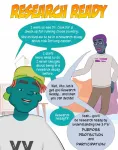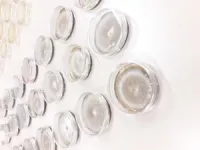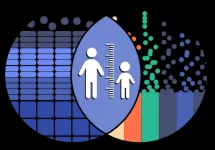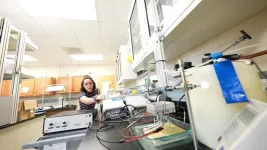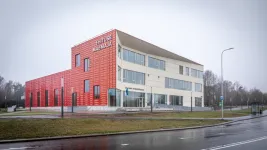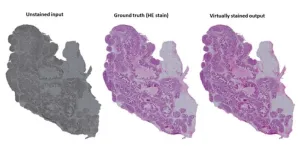(Press-News.org) As researchers continue to make advances in new cancer prevention and treatment methods, it will not have much impact if the community is unaware and not engaged. For this reason, community outreach and engagement (COE) efforts are an important pillar of the University of Cincinnati Cancer Center’s mission.
Cancer Center researchers will present research abstracts on several COE initiatives at the American Association for Cancer Research Annual Meeting 2023, held in Orlando, Florida, April 14-19.
Encouraging undergraduate community involvement
To overcome lack of access to cancer prevention, screening and treatment in underserved communities, it’s necessary for the health care workforce to be diverse and dedicated to understanding and being a part of the community they seek to serve.
The University of Cincinnati Cancer Center established the Cancer Research Scholars Program, supported in part by the National Cancer Institute, that offers 20-23 undergraduate students unique paid research opportunities and educational experiences including cancer topics, professional development, team science, cultural humility and microaggression training.
“By inviting trainees into the community early, we invite them to more fully see and experience the journeys of medically underserved populations,” said Melinda Butsch Kovacic, PhD, associate director for community outreach & engagement at the Cancer Center. “Such experiences, we hope, will help them better tailor their future care and research to these populations’ unique needs so that they can experience healing at least equal to those with greater resources.”
In 2022, scholars participated in summer field experiences including working with the Cancer Justice Network to better understand cancer-related grief, working with Queens Village Cincinnati volunteers to co-create a breast cancer awareness program for African American nursing mothers and offering a Reducing Your Risk Health Fair to Cincinnati’s Norwood community.
Butsch Kovacic said some scholars had never thought about how the life experiences of populations different than their own may affect their approach to cancer care and health care in general, while others had previously worked with medically underserved communities and had a good foundation to build upon.
“Together they were able to give us insights about how to improve our community outreach efforts for both participants and our invaluable volunteers,” she said. “We look forward to future efforts with new community partners and new scholars and hope to get greater participation from mentors too.”
Plans are already underway for the 2023 Cancer Research Scholars Program, and annual tracking of the scholars will help determine the program’s long-term impact on the cancer workforce.
Making health fairs more engaging
Typical health fairs have tables full of written educational information for attendees, but Butsch Kovacic, We Engage 4 Health and their research team implemented a different strategy through three-panel graphic style stories with a fourth panel that outlines health challenges and healthy actions related to a given topic.
“People tend to better engage with stories and understand complex information described in them. They are more easily remembered and acted on,” Butsch Kovacic said. “Plus, they are low stakes, meaning you can have a challenging discussion without having to get too personal by talking about the story character’s instead.”
Health fair attendees are invited to read the story aloud together, creating a more engaging and memorable experience as they talk through the story’s problem, action and resolution.
“The goal of this activity is to spur a meaningful discussion and a willingness to commit to healthy actions that relate to prevention and screening,” Butsch Kovacic said. “Some of our tables have hands-on science experiences to help attendees better understand the topic.”
While initially the team was unsure if adults would appreciate the stories, Butsch Kovacic said they found they are useful for all ages.
“If we asked people who have never read one of our stories with us about their preference, many would not choose learning via this story-based method,” she said. “However, many choose this approach over mostly text and text with graphics after they have had the opportunity to experience learning in this way.”
With a goal to continue to make learning accessible, fun and actionable, Butsch Kovacic said the team plans to continue to use and adapt the materials and create new stories to best serve the communities they are working with.
Helping community members become research ready
Even as certain racial/ethnic minority groups get cancer more often, are diagnosed at younger ages and are at risk for earlier death, clinical trials are still lagging behind in including adequate representation from these groups.
To encourage more equitable participation and fight against cancer disparities, a research team led by Butsch Kovacic and We Engage 4 Health created a graphic-style story called “Research Ready.” The story follows a teen, Vito, considering whether he wants to participate in a clinical research study about lung cancer.
The Research Ready story is used by community research advocates to educate potential research participants on the purpose of cancer research, how they are kept safe while participating and why people from diverse backgrounds are needed to participate.
Butsch Kovacic said the aim of the initiative is for patients considering participating in research to make decisions “based on facts, not fears.”
“We encourage our participants to ask research study staff questions,” said Butsch Kovacic. “Our accompanying activity supports them in knowing what questions that they want to ask. Many marginalized groups fail to get access to the innovation and high-quality care associated with clinical trials because of fear as a result of historical injustices related to research.”
Initial data from the pilot program showed these discussions have been useful in increasing hesitant patients’ willingness to consider research participation and their perception of research safety.
When working with cancer survivors to develop the program, many said it is better to have survivors serving as the advocates guiding patients through the information. As the program expands, Butsch Kovacic said more survivors will be trained to serve as advocates.
“Their role would be to facilitate the reading of the story, activity and discussion in a non- judgmental way and without pressuring participants to participate,” Butsch Kovacic said. “Instead, this discussion is about discovery and an invitation to consider participation.”
Helping adolescents become research ready
The research team used the same Research Ready story and activity targeting adolescents, who often have a lower perception of risk and are more susceptible to peer pressure from parents and family members when making decisions about research participation.
“This work is about introducing health science research and clinical research to youth,” Butsch Kovacic said. “We found that their perceptions of safety are critical in their decision making and that youth regardless of racial group similarly benefit from reading the story aloud together and participating in the accompanying decision-making activity.
The data suggests the Research Ready approach may be a useful tool in promoting future research participation and engaging a variety of adolescent ethnic and racial groups commonly underrepresented in cancer research.
Undergraduate cancer research scholars’ community field experiences encourage community engagement to curb future disparities in the cancer workforce will be presented April 18 from 1:30-5 p.m. by Butsch Kovacic during the Community-based Research and Biobanking Research poster session.
Reducing your risk cancer-focused health events to meaningfully engage the medically underserved and diminish future cancer disparities will be presented by Butsch Kovacic April 18 from 9 a.m. to 12:30 p.m. during the Diet, Nutrition, Lifestyle and Environment and Cancer Prevention poster session.
Community cancer research advocates: Helping underrepresented minority groups become research ready will be presented April 16 at 4:01 p.m. during the Patient and Community Advocate Partners in Cancer Research special session and April 18 from 1:30-5 p.m. during the Community-based Research and Biobanking Research poster session. UC research scientist and cancer survivor Alique Topalian, PhD, will present the research.
Research Ready graphic-style story to support future research participation among adolescents will be presented April 18 from 1:30-5 p.m. during the Community-based Research and Biobanking Research poster session by Lauren Bates, PhD, postdoctoral fellow.
END
Improving community outreach and engagement
University of Cincinnati Cancer Center researchers present abstracts at AACR
2023-04-14
ELSE PRESS RELEASES FROM THIS DATE:
Healing the unhealable: New approach helps bones mend themselves
2023-04-14
Young babies and newborn mice can naturally heal damage to the bones that form the top of the skull, but this ability is lost in adults. In a new study published in Proceedings of the National Academy of Sciences, University of Pittsburgh researchers developed a novel approach that promoted bone regeneration in mice without implantation of bone tissue or biomaterials.
The technique uses a device similar to an orthodontic wire used to realign teeth to carefully stretch the skull along its sutures, activating ...
Scientists narrow down pool of potential height genes
2023-04-14
When it comes to height, our fate is sealed along with our growth plates—cartilage near the ends of bones that hardens as a child develops. Research publishing April 14 in the journal Cell Genomics shows that cells in these plates determine the length and shape of our bones and can hint at our stature. The study identified potential "height genes" and found that genetic changes affecting cartilage cell maturation may strongly influence adult height.
"The study is really understanding ...
Finding the dream team to beat the heat
2023-04-14
Associate Professor Jonathan Boreyko leads a team at Virginia Tech that has built a strong portfolio of work with ice and water, exploring the possibilities for de-icing planes, building novel water harvesting devices, and creating snow globes out of bubbles. This familiarity with water has given the team a strong sense of its behavior in different states, leading to a new project that shows how ice quenches heat in comparison to water. The findings were published in Chem on April 14.
Mojtaba Edalatpour and master’s student Camryn ...
Analysis of health and prescription data suggests chronic health conditions in U.S. incarcerated people may be severely undertreated
2023-04-14
Chronic conditions such as type 2 diabetes, asthma, HIV infection, and mental illness may be greatly undertreated in the U.S. jail and prison population, suggests a new study from researchers at the Johns Hopkins Bloomberg School of Public Health.
For their analysis, the researchers used national health survey data covering 2018 to 2020 to estimate rates of chronic conditions among recently incarcerated people, and a commercial prescription database to estimate the distribution of medication treatments to the jail and prison population. Their analysis suggests ...
In-person vs virtual education and community COVID-19 case incidence following school re-openings
2023-04-14
About The Study: In a study of matched pairs of counties that reopened with in-person versus virtual instruction at the secondary school level in the 2020 to 2021 academic year, counties with in-person school instructional models early in the COVID-19 pandemic experienced increases in county-level COVID-19 incidence at six and eight weeks after in-person reopening, compared with counties with virtual instructional models.
Authors: Meredith Matone, Dr.P.H., of Children’s Hospital of Philadelphia, is the corresponding author.
To access the embargoed study: Visit our For The ...
Black representation in the primary care physician workforce and its association with population life expectancy
2023-04-14
About The Study: The findings of this study of survival outcomes for 1,618 U.S. counties suggest that greater representation of Black primary care physicians (PCPs) in the PCP workforce is associated with improved survival-related outcomes for Black individuals, although there was a dearth of U.S. counties with at least one Black PCP during each study time point. Investments to build a more representative PCP workforce nationally may be important for improving population health.
Authors: John E. Snyder, M.D., M.S., M.P.H., and Rachel D. Upton, Ph.D., of the U.S. Department of Health and Human Services in Rockville, Maryland, are the corresponding ...
Racial, ethnic differences in barriers faced by medical college admission test examinees
2023-04-14
About The Study: In this study of 81,755 Medical College Admission Test examinees, American Indian or Alaska Native, Black, and Hispanic students reported lower parental educational levels, greater educational and financial barriers, and greater discouragement from pre-health advisers than white students. These barriers may deter groups underrepresented in medicine from applying to and matriculating at medical school.
Authors: Jessica Faiz, M.D., M.S.H.P.M., of the Veterans Affairs Greater Los Angeles Healthcare System and UCLA in Los Angeles, is the corresponding ...
Calling AI experts! Join the hunt for exoplanets
2023-04-14
Artificial Intelligence (AI) experts have been challenged to help a new space mission to investigate Earth’s place in the universe.
The Ariel Data Challenge 2023, which launches on 14 April, is inviting AI and machine learning experts from industry and academia to help astronomers understand planets outside our solar system, known as exoplanets.
Dr Ingo Waldmann, Associate Professor in Astrophysics, UCL (University College London) and Ariel Data Challenge lead said:
“AI has revolutionised many fields of science and industry in the past years. The field of exoplanets has fully arrived in the era of big-data and cutting edge AI is needed to break ...
Estonian researchers developed a method for instant energy-performance label
2023-04-14
The researchers of the FinEst Centre for Smart Cities of Tallinn University of Technology (Estonia, Europe) developed the DigiAudit platform to monitor and analyse energy use and indoor climate indicators of buildings and large real estate portfolios in real time. Thinnect, an Estonian IoT start-up company, will help sell the solution and market it worldwide.
We can only reach zero-emission buildings when we have reliable data
The European Union has set a target for all buildings to be zero-emission, or near-zero energy, by 2050. However, there is no reliable data on the energy consumption of many buildings, so it is not possible to monitor the condition ...
Researchers developed an AI-based method to replace chemical staining of tissue
2023-04-14
Researchers from the University of Eastern Finland, the University of Turku, and Tampere University have developed an artificial intelligence-based method for virtual staining of histopathological tissue samples as a part of the Nordic ABCAP consortium. Chemical staining has been the cornerstone of studying histopathology for more than a century and is widely applied in, for example, cancer diagnostics.
“Chemical staining makes the morphology of the almost transparent, low-contrast tissue sections visible. Without it, analysing tissue morphology is almost impossible for human vision. Chemical staining is irreversible, and in most ...
LAST 30 PRESS RELEASES:
CU Anschutz School of Medicine receives best ranking in NIH funding in 20 years
Mayo Clinic opens patient information office in Cayman Islands
Phonon lasers unlock ultrabroadband acoustic frequency combs
Babies with an increased likelihood of autism may struggle to settle into deep, restorative sleep, according to a new study from the University of East Anglia.
National Reactor Innovation Center opens Molten Salt Thermophysical Examination Capability at INL
International Progressive MS Alliance awards €6.9 million to three studies researching therapies to address common symptoms of progressive MS
Can your soil’s color predict its health?
Biochar nanomaterials could transform medicine, energy, and climate solutions
Turning waste into power: scientists convert discarded phone batteries and industrial lignin into high-performance sodium battery materials
PhD student maps mysterious upper atmosphere of Uranus for the first time
Idaho National Laboratory to accelerate nuclear energy deployment with NVIDIA AI through the Genesis Mission
Blood test could help guide treatment decisions in germ cell tumors
New ‘scimitar-crested’ Spinosaurus species discovered in the central Sahara
“Cyborg” pancreatic organoids can monitor the maturation of islet cells
Technique to extract concepts from AI models can help steer and monitor model outputs
Study clarifies the cancer genome in domestic cats
Crested Spinosaurus fossil was aquatic, but lived 1,000 kilometers from the Tethys Sea
MULTI-evolve: Rapid evolution of complex multi-mutant proteins
A new method to steer AI output uncovers vulnerabilities and potential improvements
Why some objects in space look like snowmen
Flickering glacial climate may have shaped early human evolution
First AHA/ACC acute pulmonary embolism guideline: prompt diagnosis and treatment are key
Could “cyborg” transplants replace pancreatic tissue damaged by diabetes?
Hearing a molecule’s solo performance
Justice after trauma? Race, red tape keep sexual assault victims from compensation
Columbia researchers awarded ARPA-H funding to speed diagnosis of lymphatic disorders
James R. Downing, MD, to step down as president and CEO of St. Jude Children’s Research Hospital in late 2026
A remote-controlled CAR-T for safer immunotherapy
UT College of Veterinary Medicine dean elected Fellow of the American Academy of Microbiology
AERA selects 34 exemplary scholars as 2026 Fellows
[Press-News.org] Improving community outreach and engagementUniversity of Cincinnati Cancer Center researchers present abstracts at AACR
